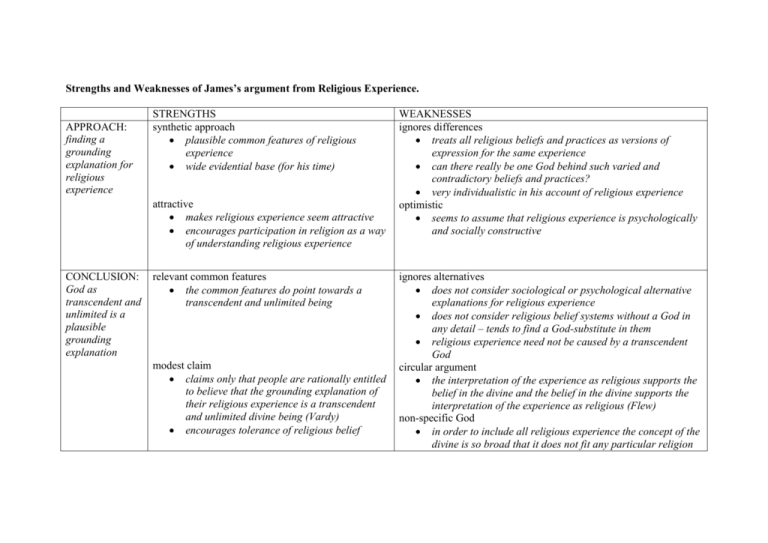Strengths and Weaknesses of James`s argument from Religious
advertisement

Strengths and Weaknesses of James’s argument from Religious Experience. APPROACH: finding a grounding explanation for religious experience STRENGTHS synthetic approach plausible common features of religious experience wide evidential base (for his time) attractive makes religious experience seem attractive encourages participation in religion as a way of understanding religious experience CONCLUSION: God as transcendent and unlimited is a plausible grounding explanation relevant common features the common features do point towards a transcendent and unlimited being modest claim claims only that people are rationally entitled to believe that the grounding explanation of their religious experience is a transcendent and unlimited divine being (Vardy) encourages tolerance of religious belief WEAKNESSES ignores differences treats all religious beliefs and practices as versions of expression for the same experience can there really be one God behind such varied and contradictory beliefs and practices? very individualistic in his account of religious experience optimistic seems to assume that religious experience is psychologically and socially constructive ignores alternatives does not consider sociological or psychological alternative explanations for religious experience does not consider religious belief systems without a God in any detail – tends to find a God-substitute in them religious experience need not be caused by a transcendent God circular argument the interpretation of the experience as religious supports the belief in the divine and the belief in the divine supports the interpretation of the experience as religious (Flew) non-specific God in order to include all religious experience the concept of the divine is so broad that it does not fit any particular religion Strengths and Weaknesses of the Ontological Argument for the Existence of God. STRENGTHS The argument is a valid deductive argument – if the premises are accurate then the conclusion must be accepted. WEAKNESSES The definition of God can only really be accepted by faith. And the claim that it is greater to exist than not to exist assumes that existence is a predicate. The argument is devotional – it recognises that the only way to understand God is through faith. The argument is arrogant - it preaches to non-believers, telling them they are foolish if they do not share the faith. The argument recognises that necessary existence is an attribute of God and uses this to argue for God’s existence. It is not clear that a claim that it is necessary to think of God can be used to argue that God necessarily exists in reality. The argument is more suited to arguing about God than inductive arguments – inductive arguments only give probability and God is not a being that could be probable, Rather, if God exists then God must exist and the ontological argument acknowledges this. The argument only shows that if God exists, then God must exist. God may have logical necessity, but logical necessity does not give factual necessity. The strengths and weaknesses of the ontological argument can be summarised in Anselm’s famous phrase – Faith Seeking Understanding. The fact that the argument begins with faith and works towards understanding accounts for both its strengths and weaknesses.






